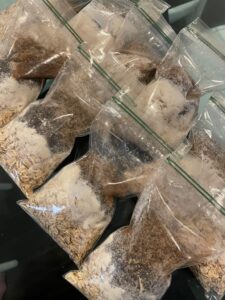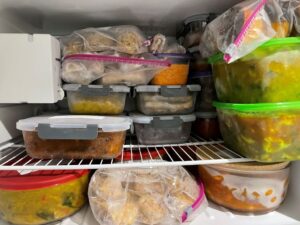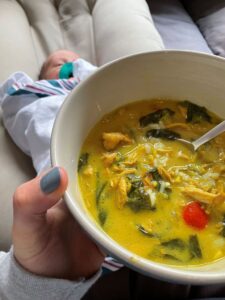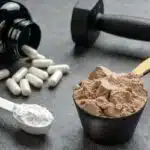Navigating Nutrition to Support Postpartum Recovery
By Rebecca Jaspan, MPH, RD, CEDS, CDCES
Congratulations! How are you and baby doing? How are you feeding your baby? How is breastfeeding going? These might be some of the questions you hear after just giving birth. While feeding your baby is a central focus in the early postpartum weeks, nourishing your own healing body is just as important. Many women prioritize their health and nutrition while pregnant, but what doesn’t always get enough attention is nutrition postpartum. Nutrient needs are actually higher in the early postpartum phase than they are during pregnancy. Whether you are breast or bottle feeding, nourished parents lead to happy and well-fed babies.
In the months leading up to having my son, I did some serious meal prep to stock my freezer with nutritious meals and snacks. As the primary meal planner and cook in the household, I knew I likely wouldn’t be up to cooking or have the time to grocery shop and cook in the first weeks to months after my son was born. While my husband doesn’t cook, he is excellent in the kitchen when it comes to making eggs, boiling pasta, and warming food up in the microwave. I imagined the first few weeks with our new baby could pose challenges to eating regular and adequate meals, so having meals prepped and ready to eat would set us up for success.
Nutrients for Postpartum
When planning my postpartum freezer stash, I focused on several nutrients important for healing. These nutrients included:
Protein- Protein is essential for the healing and repair of tissues. Specifically, protein supplies collagen-building amino acids, glycine, proline, and hydroxyproline, which are key for connective tissue healing after birth.1 High protein foods also help to conserve muscle while resting and recovery.
Carbohydrates- Carbohydrates are the body’s preferred fuel source and provide an important source of energy. Whether or not you are breastfeeding, the body is working hard to recover from childbirth. Not to mention taking care of a newborn is a lot of work! Your body needs carbohydrates to restore glycogen in the muscles and provide a constant supply of energy.
Iron- Iron helps transport oxygen in the blood and is imperative for energy production. Iron needs increase postpartum to combat blood loss and prevent anemia. There is also research showing that adequate iron intake can help prevent postpartum depression.2
Healthy Fats- Foods high in healthy fats are essential for keeping you full and satisfied. Monounsaturated fats and omega-3 fatty acids are also important for their anti-inflammatory effects while the body is healing. If you are breastfeeding, high fat foods helps to enhance breastmilk and is important for baby’s brain development.3
Anti-inflammatory spices- Speaking of inflammation, warming, anti-inflammatory spices such as ginger, turmeric, and cinnamon, are a key nutrient for postpartum.
Fiber- As constipation can be an issue for many postpartum, high fiber foods should be included with meals and snacks. Vegetables, fruits, oatmeal, legumes, and nuts are all good sources of fiber.
So, what should I cook?
With these key nutrients in mind, I made a list of all of the meals and snacks I wanted to freeze before having my baby. Picking a couple of recipes to make each weekend was a helpful way for me to space out the cooking rather than cramming it all in a few weeks before baby arrived. Making a calendar and scheduling when you are going to make your meals can also be a useful way to stay organized.
I prioritized soups and stews that were easy to eat, froze well, and covered all of the nutrition bases. Some favorites were beef stew and chicken curry made with bone broth, turkey and bean chili, and coconut curry lentil soup. I also made a couple of batches of meatballs that could be easily warmed up with pasta and jarred sauce. For breakfast, I premade egg, cheese, and spinach breakfast burritos, baked oatmeal, and homemade oatmeal packets. Typically, I load up my oatmeal with chia seeds, flaxseeds, collagen powder, and cinnamon. Putting all the ingredients in little bags ahead of time was a huge time saver.

High energy snacks were essential in between meals, as the postpartum hunger is real! I made nutrient dense trail mix cookies, almond butter oatmeal bars, and energy bites with prunes and walnuts for easy grab and go snacks. Nuts, granola bars, and peanut butter and jelly sandwich sandwiches were convenient options as well.
While all of this meal prep was certainly a lot of work before baby is born, it pays off in dividends after. Having nourishing meals and snacks on hand optimizes postpartum recovery so you have more time to soak up the newborn cuddles.
- Solano F. Metabolism and Functions of Amino Acids in the Skin. Adv Exp Med Biol. 2020;1265:187-199. doi: 10.1007/978-3-030-45328-2_11. PMID: 32761577.
- Wassef A, Nguyen QD, St-André M. Anaemia and depletion of iron stores as risk factors for postpartum depression: a literature review. J Psychosom Obstet Gynaecol. 2019 Mar;40(1):19-28. doi: 10.1080/0167482X.2018.1427725. Epub 2018 Jan 24. PMID: 29363366.
Meldrum S, Simmer K. Docosahexaenoic Acid and Neurodevelopmental Outcomes of Term Infants. Ann Nutr Metab. 2016;69 Suppl 1:22-28. doi: 10.1159/000448271. Epub 2016 Nov 15. PMID: 27842311.







